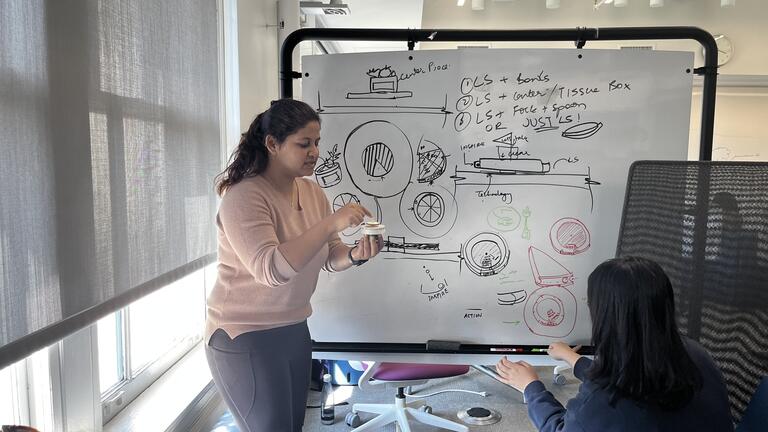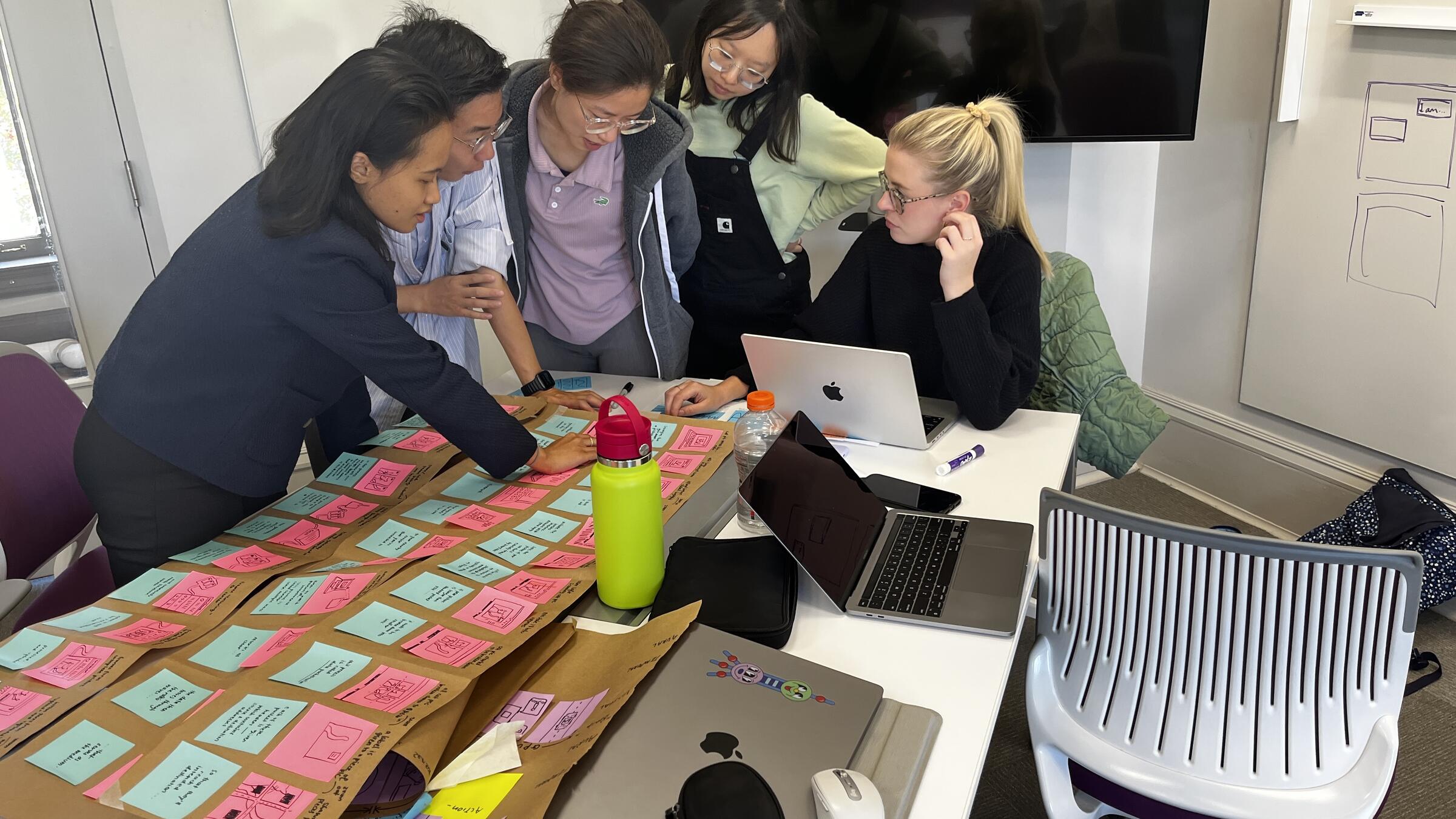
Master of Design in Design for Interactions
Our MDes program supports those with design backgrounds who seek to transform their practice.
The School of Design welcomes students who hold undergraduate degrees in a design-based field and have at least one year of professional experience to apply to our MDes program. If you’re looking to build on a strong foundation in design by studying the “big picture” aspect of designing for interactions, which involves communities, organizations, cultures, contexts, and systems, our MDes program can help you. Throughout the program, you’ll work with some of the brightest thinkers and most talented practitioners in the field, gaining exposure to approaches, ideas, and methods at the forefront of design. Studies rooted in communication, systems thinking, futuring, speculative design, design technology, ethics, and design research form the basis of the MDes. You’ll learn how to apply rigorous processes for documenting, analyzing, and understanding the past and present to propose more desirable systems and interactions for the future.
The diversity of our MDes cohort creates an incredible group of people with whom to learn.
In addition to bringing rich cultural experiences from around the world, our MDes students hold a wide range of professional and academic expertise, including undergraduate degrees in design-based disciplines such as communication design, product design, user experience design, architecture, and service design. This diversity enriches everyone’s learning experience. Our requirement for MDes students to possess at least one year of professional experience also elevates learning in the form of effective collaboration.

Our rigorous curriculum balances structure and autonomy.
Spanning four semesters over the course of two years, the MDes program will challenge how you perceive the roles design can and should play in aiding various forms of interactions throughout society. Each semester you will encounter thoughtfully aligned seminars, studios, and labs that equip you with important knowledge and skills to aid your development as a design leader. Through individual and team-based projects that focus on the design of services or social innovation concepts, you’ll explore design principles, approaches, theories, and tools that are essential for designing for interactions. You may also take advantage of CMU’s stature as a renowned liberal arts research university to pursue research opportunities with faculty and take courses across campus to broaden and deepen your education. Even though designers typically work in service of others and respond to specific prompts, we recognize the importance of your unique interests. Our MDes courses provide you with the autonomy to direct your individual work and offer support as you chart your personal path and discover your design “voice”.
The MDes thesis provides an opportunity for you to conduct rigorous design research.
A unique feature of the MDes program is the design thesis—an independent research and design project that you will conduct under the mentorship of a faculty advisor. The thesis is complemented by a required second-year seminar, elective coursework in the School of Design, and other departments across the Carnegie Mellon campus. In the first year, you'll identify possible thesis topics relative to School of Design faculty expertise, investigate ways of conducting a thesis, construct a researchable question that will frame your project, secure a thesis advisor, and write a proposal for your second year of study. In the second year, you'll conduct intensive research that aligns with an appropriate design process and culminates in a design project that addresses your research question. You will also write a document that describes your steps and discoveries. Throughout the process you’ll participate in public sharing sessions of thesis work and give and receive feedback to further your inquiry and understanding. You can peruse master’s theses from students in the School of Design online at KiltHub.
-
- Beyond Big Beef: Transitions to Food Citizenship Through Community, Ema Karavdic
- Affordances for Multi-device Gestural Interactions in Augmented Reality, Shengzhi Wi
- Amplifying ASL: Designing with Futuring and Inclusion, Mackenzie Cherban
- tac.tic: Tactile design language for indoor-outdoor pedestrian navigation, Chirag Murthy
- Designing for Trust, Meric Dagli
- Building Long-Term Relationships between People and Products through Customization, Ashlesha Dhotey
- Designing for Learning Growth: Encouraging Metacognitive Practice to Support Growth Mindsets in Students, Chen Ni
- Project Care: Empowering Elderly Chronic Disease Patients to Better Understand and Manage Their Treatment Plans Through Enhanced Patient-Centric Services and Systems, Suzanne Choi & Laura Rodriguez-eng
Our MDes equips you with important design skills and knowledge that enable you to realize a lifelong career in design.
The MDes is considered to be a terminal degree in design, and graduates are poised to take on leading roles in professional practice worldwide. Alumni are also well-positioned to acquire entry-level teaching and research positions at universities. As a graduate, you may choose to deepen your studies through a design-focused PhD program, like that offered by the CMU School of Design, or continue your education in areas such as business, human-computer interaction, or public policy. Whatever direction you choose to pursue, our MDes will provide you with a strong design education that builds on your background and strengthens the positive trajectory for achieving your professional goals.
Master of Design in Design for Interactions (MDes) Curriculum
Fall Semester, Year 1
Explore design for interactions, design for services, and design for social innovation and study their potential impact in business and policy. Expand your skills in communication and interaction design.
-
Investigate the history, current state, and future of interaction design practice and research.
-
Envision and prototype preferred futures by giving form to the behaviors and interactions of products, services, and systems.
-
Use design strategies to decode complex information and communicate messages clearly.
-
Learn to use design tools for physical and digital environments to support your studio projects.
-
Investigate your personal interests, probe existing theses, and study various ways of conducting a thesis.
-
Learn about faculty research.
Spring Semester, Year 1
Investigate business and policy opportunities in design for services and social innovation through research-based team project work in your studio course. Work with advisors to prepare your thesis proposal.
-
Choose to study either Transition Design, Social Innovation or Design for Service.
-
Tackle a client-sponsored team project using an integrated research and design process.
-
Learn and apply a range of participatory methods for exploratory, generative, and evaluative research and design.
-
Construct a researchable question to frame your project, secure an advisor, and plan and propose the research and design approach you'll conduct in your second year of study.
-
Take a design elective or a course outside of design to complement your skills and knowledge. We recommend courses in policy, business, service or social innovation, interaction or communication design, or professional writing.
Fall Semester, Year 2
Through thesis project work and your choice of electives, craft a generalist degree in design for interaction, or develop a concentration in design for services or social innovation.
-
Build on the foundation of coursework and studios through thesis research with your advisor. Conduct research and develop creative concepts to investigate a significant challenge, engage with stakeholders in the real world to inspire and evaluate your ideas, and review your progress and evolving body of work with peers and your advisor to inform your subsequent steps.
-
Survey new models and approaches to interaction design and design for service in professional practice.
-
Learn research strategies and tools to assist you in your literature and artifact reviews, investigate making as a means of exploring and understanding your topic, and explore ways of visualizing your discoveries to aid your learning and share your findings with others.
-
Take a design elective or a course outside of design to complement your skills and knowledge. We recommend courses in policy, business, service or social innovation, interaction or communication design, or professional writing.
Spring Semester, Year 2
Bring your thesis project to fruition by synthesizing your discoveries and disseminating valuable insights that have the potential to benefit others. Take advantage of electives to cultivate your expertise in design for interaction, and design for services or social innovation.
-
Model, test, and refine, your design concepts that have emerged from your year of deep research and design exploration to deepen your understanding of your topic, synthesize your findings and apply what you learned to your project, document, present, and publicly defend your thesis, and showcase your project as a unique feature of your design portfolio to demonstrate your ability to take on a significant research and design project.
-
Explore ways of encapsulating your study, synthesizing and structuring your discoveries, and writing and designing your thesis for dissemination.
-
Take a design elective or a course outside of design to complement your skills and knowledge. We recommend courses in policy, business, service or social innovation, interaction or communication design, or professional writing.
-
Take a design elective or a course outside of design to complement your skills and knowledge. We recommend courses in policy, business, service or social innovation, interaction or communication design, or professional writing.
We invite you to connect with us and learn more about the School of Design and our MDes program.
Check out examples of students’ work, join us for an online visitors session, and review other areas of our site, such as the Learning Outcomes for our MDes program, Frequently Asked Questions, and Application Process. Plan a visit to Carnegie Mellon and coordinate a tour of the School of Design while you’re here. Contact us to schedule a call with our academic advisor to discuss any outstanding questions that arise. We look forward to meeting you!